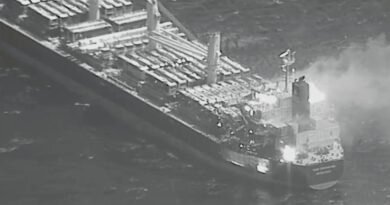CENTCOM reports US intercepted 80 Iranian UAVs and 6 ballistic missiles targeting Israel
CENTCOM reported that U.S. European Command destroyers assisted in neutralizing the threat over the weekend.
The Pentagon disclosed on April 14 that U.S. forces had eliminated over 80 unmanned aerial vehicles (UAVs) and at least six ballistic missiles aimed at Israel from Iran and Yemen.
CENTCOM mentioned that U.S. European Command destroyers provided support in addressing the threat on April 13 and the morning of April 14.
“Iran’s continuous unprecedented, malign, and reckless actions pose a threat to regional stability and the safety of U.S. and coalition forces,” stated CENTCOM, which falls under the Department of Defense and oversees U.S. military operations in 20 Middle Eastern nations.
“CENTCOM remains ready to assist in defending Israel against these perilous actions by Iran,” it continued. “We will collaborate with all regional partners to enhance regional security.”
Iran launched numerous missiles and one-way attack UAVs at Israel late on April 13 and early on April 14 in what is considered its first direct attack on Israeli territory.
The attack, originating from within the Islamic regime, was in response to an Israeli strike on a Syrian compound earlier in April, resulting in the deaths of seven members of its Revolutionary Guard Corps, as per Iran.
Minimal Impact
Israel’s Iron Dome defense system, supported by the United States, Britain, France, and Jordan, successfully intercepted 99 percent of the incoming projectiles.
One missile caused minor damage to an air base, and a 7-year-old girl was injured, relayed Daniel Hagari, an Israeli army spokesman, to The Associated Press.
President Joe Biden announced on April 13 that the U.S. military aided Israel in neutralizing nearly all the UAVs and missiles launched by the Islamic regime.
President Biden further mentioned that the United States had already deployed aircraft and ballistic missile defense destroyers to the region before the unprecedented attack.
Response Plans
While the United States refused to partake in a retaliatory offensive against Iran, Israel cautioned Tehran that it would seek retribution from the Islamic regime in response to the missile strikes launched against Israel.
“We will form a regional coalition and exact a price from Iran in a manner and timing that suits us,” reiterated centrist minister Benny Gantz ahead of a war cabinet gathering on April 14, underscoring that Israel’s retaliatory actions are ongoing.
The country’s war cabinet is scheduled to convene once more on Monday to deliberate on how to respond to Iran’s unprecedented attack.
“Our retaliation will far surpass tonight’s military operation if Israel retaliates against Iran,” remarked armed forces chief of staff Major General Mohammad Bagheri to state-run media, warning the United States that any backing of an Israeli counterattack against Iran could lead to American bases becoming targets.
Following the eruption of threats of open conflict between the longstanding Middle East adversaries, the United Nations (U.N.) appealed for an “immediate halt to these hostilities.”
“I am extremely concerned about the very real risk of a devastating region-wide escalation. I urge all parties to exercise utmost restraint to prevent any actions that may result in major military confrontations on multiple fronts in the Middle East,” stated U.N. Secretary-General António Guterres in an issued statement late on April 13, urging an end to hostilities.
Mr. Guterres emphasized that his office has “repeatedly emphasized that neither the region nor the world can afford another war.”





